5 Things You Didn't Know About Calories… But Should

5 Things You Didn't Know About Calories… But Should
Dec 7, 2021 | By JOI team
By Carolina Schneider, MS, RD (@thegreenrd)
For many people, calories are the make-or-break when deciding which foods to eat. They are the most feared - and misunderstood - part of nutrition labels. But what are calories? In science and nutrition, calories are nothing but a unit of energy.
All You Need to Know About Calories
But what exactly do calories have to do with energy? The chemical bonds in macronutrients (i.e., carbohydrates, proteins, and fats) store energy, and calories are simply the way we measure this amount of energy.
Nerdy talk aside, the misconceptions around calories can have negative effects. Such misconceptions are often the culprit of unhealthy relationships with food, and negative food behaviors.
When it comes to nutrition and the internet, you’ll find all sorts of contradicting information. This confuses consumers and makes eating a lot more complicated than it should be.
Having correct information is the key to empowering individuals with knowledge. So that they can make educated food choices when it comes to their health.
1. Calories do not determine health
Let’s just put it this way. You can get 150 calories from a handful of almonds, or you can get 150 calories from a chocolate chip cookie.
The almonds provide you with cholesterol-lowering healthy fats, antioxidant-rich vitamin E, and gut-friendly fiber. The cookie provides loads of added sugars and saturated fats, two culprits of chronic disease.
If you’re only looking at calories, you can eat 2,000 calories per day from hot dogs, chips, and candy bars. Or you can eat the same amount of calories from whole grains, legumes, fruits and vegetables.
Calories are not determinants of health. Instead, the source and quality of your calories is what differentiates someone in good health from someone popping pills for high cholesterol.
At the same time, you’ll find “low-cal”, “light” or “lite” all over food products. Then you turn over the package and read: artificial flavors, alternative sugars, food dyes, flavor enhancers and some other unpronounceable ingredients.
While this food may be providing zero calories, it is also providing zero nutrients. Trust me, you’re better off eating a 90-calorie spoonful of peanut butter.
“You are what you eat” is absolutely correct. You can eat few calories in a day and look thin, but at the same time be deficient in essential vitamins, have poor digestive health, have low immune function, high inflammation levels, and uncontrolled blood sugar.
That’s because if your calorie intake is from highly processed foods that lack essential nutrients, then chronic disease and metabolic disorders can be just around the corner.
Now, if your calories are coming from nutrient-dense, minimally processed foods that are high in fiber, vitamins and minerals, lean protein and healthy fats, that's a different story. Chances are you will feel great and your body will become healthier. And the side effect? You’ll look your best.

2. Not all calories are created equal
The amount of work it takes for your body to digest food is known as the Thermic Effect of Food (TEF). But this is different for different kinds of food.
The higher the TEF, the more energy your body needs to digest, absorb and dispose of that food. In short, foods affect your metabolism in different ways.
Foods also have different effects on hormones and how full/satisfied you feel after eating. So food impacts our senses of hunger and fullness differently, regardless of the number of calories it contains.
Think about eating 200 calories from a bag of potato chips versus 200 calories from a large head of broccoli. Likely you’re able to eat the bag of chips and still feel hungry, but are barely able to finish the head of broccoli.
What’s more, essential nutrients such as carbohydrates, proteins and fats perform unique functions in our body. That means that calories coming from these macronutrients cannot be simply interchanged.
We must get the right amount of each nutrient in order for bodily functions to take place, and you know, keep us alive. So consuming enough calories from proteins, healthy fats and non-refined carbohydrates is essential. These include maintaining a healthy immune function, strong bones, muscle integrity, etc. Where you choose to get your calories from has a huge impact on how efficiently your body functions.
Finally, the amount of calories you actually absorb depends on a variety of factors, such as your digestive health and gut microbiome. Yes, the millions of bacteria residing in your large intestine do get a say on how much energy (calories) you uptake or harvest from foods. And the diversity of your gut bacteria population depends on your diet, environment, stress levels, exposure to parasites, antibiotics, and genetics.
This means that individuals have unique gut microbiomes and therefore some people may metabolize calories differently than others. And these are the reasons why not all calories are created equal.

Photo Sarah Pflug
3. Cutting calories won’t always solve your weight issues
In fact, it may worsen it. Restricting calories to a point where your body is in extreme deficit may actually work against your ability to lose weight in the long term.
Initially, you will likely experience weight loss. But eventually you will hit a plateau. That’s because--surprise, surprise--your body is smart. It will adapt to any change or stress. This means that if you’re consuming significantly less calories than what you need, your body may slow your metabolism down to preserve calories, or store nutrients as fat to conserve energy (thank you, survival mode).
While cutting calories to very low amounts may cause unwanted metabolic effects, counting calories is also likely to backfire, but in a more psychological manner.
That’s because the act of counting calories moves in the opposite direction of a healthy relationship with food. Having a healthy relationship with food means that one is able to see food as nourishment, pleasure, enjoyment, and is able to have a balanced and flexible eating habit.
The minute a person starts to make dietary choices based mostly on the number of calories in food, it is no longer a natural habit of eating food. In fact, an obsessive preoccupation with calories, such as counting and/or tracking calories, is a psychological and emotional behavior associated with common symptoms of eating disorders, such as anorexia nervosa.
What’s more, the restrictive act of counting and cutting calories fails to take into account our bodies’ hunger and fullness cues. (Those are fancy terms for eating when you’re actually hungry and stopping when you’re actually full). We’re better able to listen to these cues when engaging in mindful, intuitive eating.
If you’re basing food choices on calories, how well are you listening to your body and identifying its needs? What if you set your caloric "cutoff" at 1,200, but your body actually needs 1,500 calories to perform basic metabolic functions? Or what if you have met your body’s needs but you eat more to meet a certain number of daily calories? Well, then you have diminished your ability to listen to your body.
On a final note, studies have shown that restricting calories can lead to increased levels of cortisol, a stress hormone known to increase appetite and weight gain.
Elevated levels of cortisol can spike cravings, which may lead to poor dietary choices, overeating and emotional eating. This behavior of calorie restriction, followed by over consumption of calories, is, sadly, a gateway drug to disordered eating. And an unhealthy relationship with food.
With that said, any type of restrictive eating and extreme dieting (looking at you, fad diets) is not sustainable over time.

4. Health is more than “calories in” versus “calories out”
Traditionally, it was believed that health and weight management relied solely on “calories in” (the amount of calories ingested), minus “calories out” (the amount of calories the body burns for energy), especially when exercising or engaging in physical activity.
However, this model fails to take into account one small detail: the nutritional value of foods. Going back to math 101, this formula says that what you eat minus what you burn equals net calories, and whether you lose or gain weight. But we hope that by now you know that’s not the whole story.
Let go back to the idea tht “not all calories are created equal.” It’s worth noting that if your “calories in” include “empty calories” (those with no good nutritional value or benefits...looking at you, delicious glazed donut) what good does that do?
Well, here is what it does: the high sugar and (essentially) no-fiber content of the donut digests quickly into sugar. This spikes your blood sugar, which in turn releases lots of insulin (the hormone that helps your body use sugars).
The occasional donut is not a problem, but the prolonged and consistent high levels of blood sugars and insulin may result in inflammation, increased fat storage, and weight gain. With that said, different foods have different effects on the “calories in, calories out” equation.
 Photo by Michele Krozser
Photo by Michele Krozser
5. Sometimes more calories are better.
No, we’re not talking about a “Big Mac” kind of more calories...
Let’s take JOI as an example. One cup of JOI milk provides roughly 90 calories and 8 grams of fat. Meanwhile, one cup of a store-bought unsweetened almond milk provides 30 calories and 2.5 grams of fat.
Now, let’s test your knowledge… JOI almond milk has more calories, and more fat (the good kind of fat), but it is made of only one ingredient- almonds. The store-bought equivalent has less calories, and less total fat, but the ingredient list reads: Filtered Water, Almonds, Calcium Carbonate, Vitamin E Acetate, Vitamin A Palmitate, Vitamin D2, Sea Salt, Locust Bean Gum, Gellan Gum, Ascorbic Acid, Natural Flavors.
Which one would you prefer for optimal health?
JOI is a highly nutrient-dense option with naturally-occuring healthy fats, protein, fiber, vitamins, and minerals. All of these are greatly beneficial for your health.
The store version of plant milk is mainly water, a few almonds, a lot of gums and “natural” flavors. Plus, it is artificially-fortified with synthetic vitamins. And because of that, we’ll take all the nutritious calories and health-promoting properties of almonds in JOI to nourish our bodies, thank you very much.
SO, CALORIES DON’T MATTER?
Don’t get me wrong, I’m not saying you can disregard the numbers on a nutrition label and eat a horrendous amount of calories.
I’m saying that the quality of your calories are far more important for your health than the number on the label. Consuming a diet rich in whole, minimally processed foods such as whole grains, legumes, fresh fruits and vegetables, nuts and seeds, is essential for optimal health.
In addition, engaging in mindful eating practices and listening to your body (when it’s hungry, when it’s full) is important. It's important in order to build a healthy and sustainable relationship with foods and honor your body’s needs.
The amount of calories your body needs depends on a variety of factors. Those factors include age, sex, height, body composition, activity level, basal metabolic rate, and overall general health. It is not a one-size fits all.
Rather than focusing on calories, focus on consuming a good balance of foods that are high in vitamins, minerals, dietary fiber, healthy fats, and protein, as these are essential to nourish your body and sustain a healthy life.
-----------------
About Carolina Schneider:
Carolina Schneider, MS, RD (@CarolinaTheGreenRD) is a registered dietitian and writer specializing in plant-based nutrition. She is the founder of Hungry for Plants, a company dedicated to offering nutrition consulting services to health and wellness brands, primarily in the plant-based food and beverage space. Carolina believes in eating better, not less. Her favorite JOI recipe is the Cashew Coconut Curry.





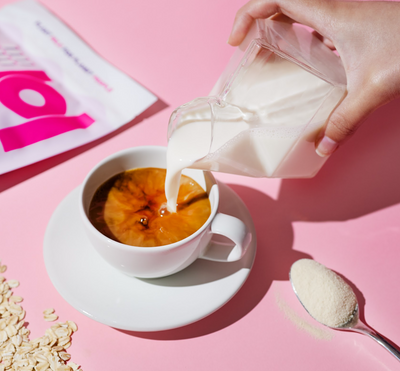
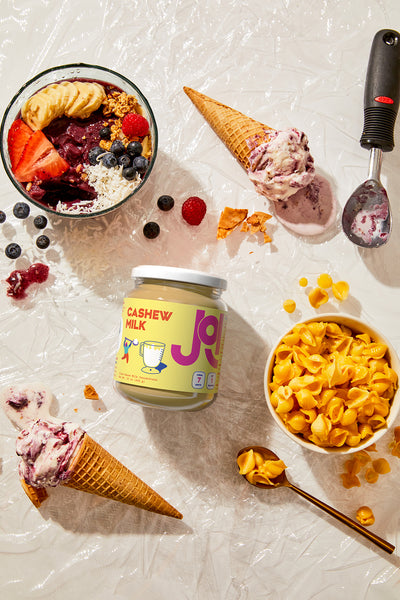
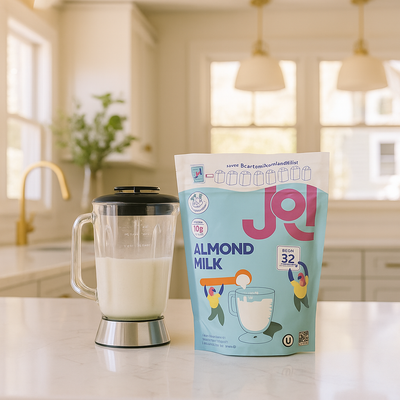
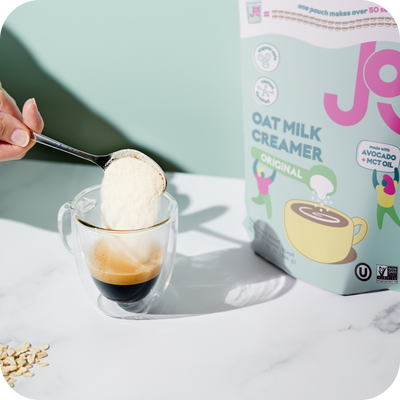
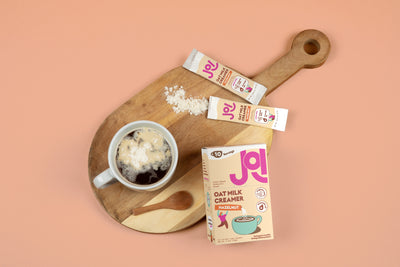
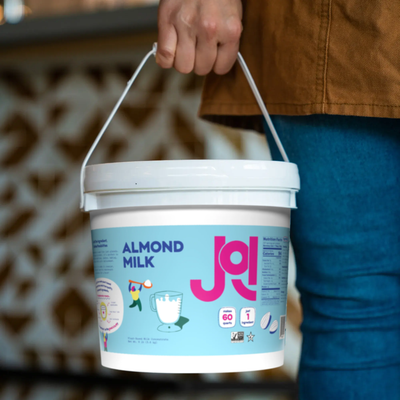
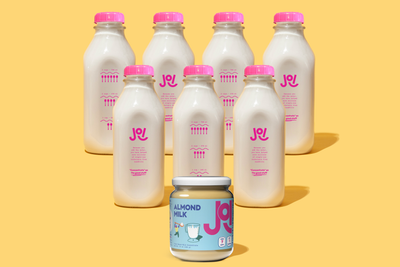
 CHECKOUT
CHECKOUT